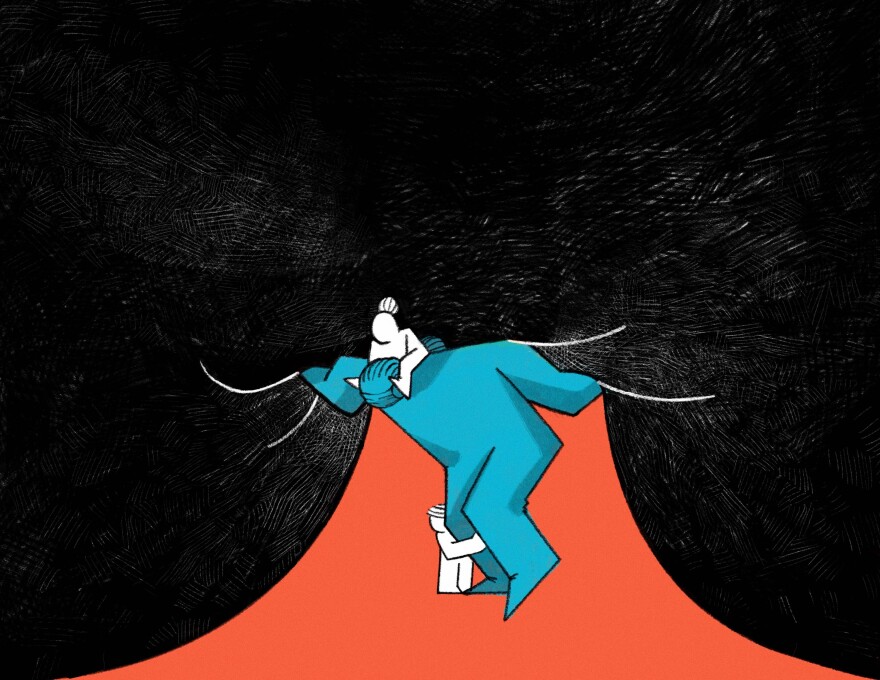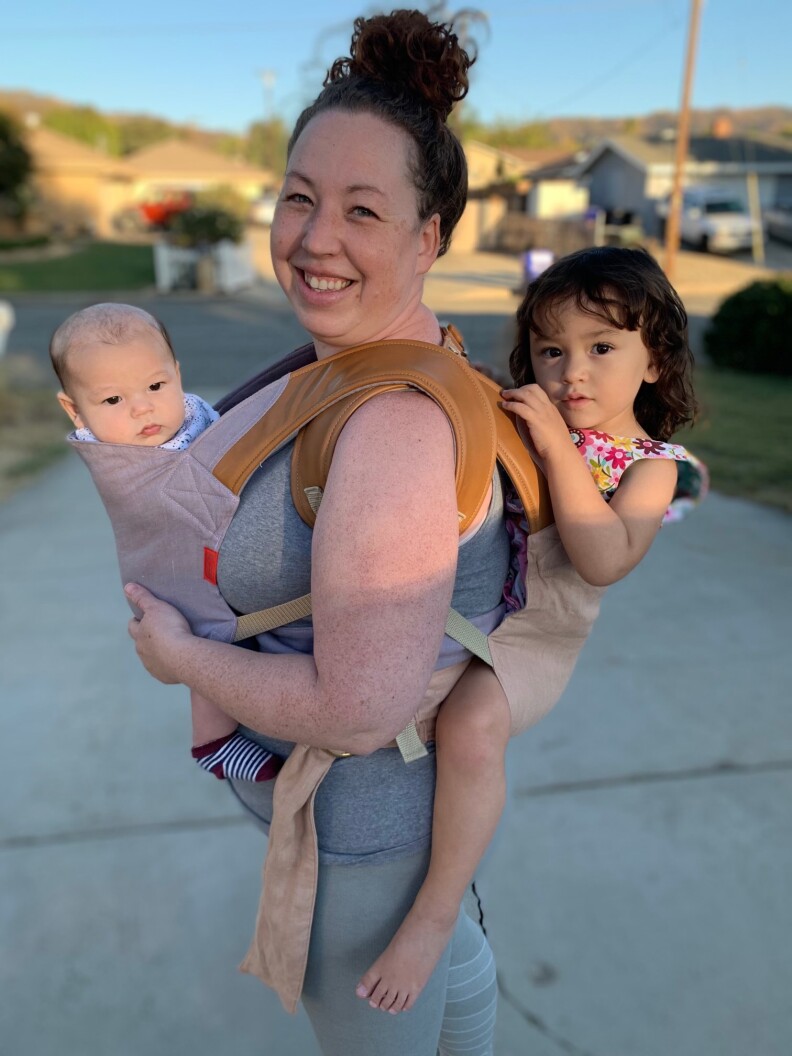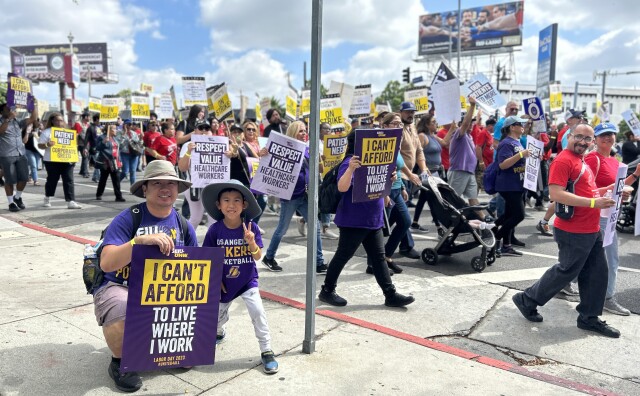Why The Pandemic Took An Especially High Mental Health Toll On New Parents

About six weeks after she gave birth to her son in the summer of 2020, Erin Sricharoon was driving to her local Starbucks in Yucaipa to get an iced chai latte when she had to pull over.
“I had all these flashes of something really awful happening either to my son while I was gone or to myself while I was driving,” Sricharoon recalls.
It was just anxiety like I never experienced before.
She called her husband from the side of the road to make sure her baby, Titus, was okay. “It was just anxiety like I never experienced before – like paralyzing anxiety,” she recalls. Unable to drive, she asked her husband to pick her up. She was having a panic attack.

With worry and fear that was debilitating, this felt different from when Sricharoon had her first child a few years back and had postpartum depression. As she began to reflect on the panic attack, she started identifying symptoms in the days leading up to it. She was irritable and angry, and had trouble sleeping.
“I do think COVID played a role in that because it was such an anxious experience to be living through a pandemic,” she said.
A Scary Time To Have A Child
A recent study from the University of Michigan found that between February and July of 2020, one in three birthing parents experienced postpartum depression, up from one in eight before the pandemic. The same researchers found that patients who gave birth during the early pandemic also reported higher distress and anxiety levels overall. Meanwhile, the greater demand for mental health treatment continues to run up against a longstanding shortage of providers.
“It’s made it much worse, a much more scary time to have a child or bring a child home to your family, largely due to the added stress and anxiety the pandemic has caused for anybody,” said Kelly O’Connor Kay, executive director of Maternal Mental Health NOW, a training and advocacy group based in L.A. County.
On top of the lockdowns and fear of infection, Kay pointed to other exacerbating factors happening at the same time.
“From the George Floyd killing, to the Black Lives Matter movement to school shootings. Right now, there's a formula shortage. And all of this just adds layers and layers of stress and anxiety onto a new parent,” Kay said.
Kacie Blackman felt this stress. A Black mom, she was 34 when she was pregnant with her son in 2020. He would be her third child, but just like Sricharoon’s son, he’d be the first to be born during a pandemic.
Blackman said that in addition to the isolation with COVID-19, she was worried about the safety of herself and her family, especially “knowing [she was] pregnant with a son, who's Black and can be profiled at any time.”
“COVID was bad, but that social unrest was just even more magnified,” she said.
COVID was bad, but that social unrest was just even more magnified.
She gave birth in August that year. Then, as she was nursing her newborn that week, she had a moment of clarity: she realized she needed help with her mental health. She wanted to talk to a therapist who was also a woman of color, but says it wasn't easy.
Blackman said she had to call her insurance for a list of providers in her area, navigate its confusing website, and talk with at least four therapists before she found someone who was the right fit.
“It shouldn't be that hard to find this information…. You really have to take the initiative,” said Blackman, an assistant professor of health sciences and at the Health Equity Research and Education Center at Cal State Northridge. She added that she wished mental healthcare was baked into standard care during pregnancy and after birth.
She said that’s especially true because for some new parents, they might not even think that they are dealing with anxiety or depression and shy away from getting any sort of mental health support. But she said it might help parents to acknowledge that pregnancy and birth are life-altering.
“You're so depleted — you gave birth,” she said. People need to be able to say, “‘this is normal, to feel depleted. I feel tired, exhausted.’”

Maternal Mental Health Clinic Inundated
In 2019, the state of California started mandating health care providers offer to screen birthing parents during pregnancy or in the year following birth with a basic questionnaire, like the Edinburgh Postnatal Depression Scale. At least nine states have similar requirements, according to the Maternal Mental Health Leadership Alliance.
Dr. Misty Richards, medical director of perinatal psychiatry at UCLA, knew the mandate would mean more patients would get flagged for potential depression and potentially hit roadblocks while looking for treatment.
“It is very hard for women to access a reproductive psychiatrist in the community. It can be quite costly. And the wait times can be four to five months, and that's an average,” Richards said.
So Richards co-founded the UCLA Maternal Outpatient Mental Health Services (MOMS) Clinic that year, for patients who would be referred from the hospital’s OB-GYN department. She wanted the clinic to provide more robust psychiatric evaluations and treatments, while connecting patients to longer-term care, and she wanted to offer a little convenience during the chaos of the first six months of postpartum.
“It's a very busy time,” she said. “Many women don't even know which way is up. So thinking about trying to call a provider and then waiting online for 30 minutes and then being shuffled around is not available to them,” she said.
Just as she anticipated, the clinic was inundated, but that was before the pandemic. After COVID hit, she saw an additional 30% in postpartum depression cases. “Based on my experience… we know that COVID has had a dramatic impact on this population,” Richards said. “It is concerning, and it’s hard because we’re a bridge clinic, and the bridge clinic has a waitlist.”
Normal Care Was Disrupted
The pandemic upended the normal labor and delivery experience, she explained. Patients had to go to appointments alone. They could only bring in one person during the actual delivery. And after the birth, which can be one of the most crucial times for a child and parent, patients could not stay in the hospital longer than 24 hours.
“That compromises some of the education that goes into infant care, breastfeeding, [and] labor recovery,” Richards said. And when they went home, their social support was limited.
Richards teaches psychiatry at the UCLA School of Medicine, and because of these influxes, she’s been telling students and residents that they might start to consider that giving birth in the COVID era is a risk factor for major depressive disorder.
Even with the increase in patients in her clinic, Richards worries that screenings leave out people who don’t see their symptoms or want to disclose them.
“They might be like, ‘No, I’m fine, I’m fine, I’m fine,’ and screen out of it,” she said. “Some of those women I worry about the most because, can they access care?”
For some parents like Erin Sricharoon, the questionnaires can feel too impersonal to share detailed self-reflections — especially since her postpartum visit was over the phone.
”It just wasn't a setting where I was like, ‘Yeah, I'm gonna let my guard down and ask for help in this particular conversation,’” she said. “Most of us know what to say on those [screenings] to go under the radar.”
After the panic attack, Sricharoon, who’s an events coordinator for Maternal Mental Health NOW, reached out herself to her doctor for help.
For Kacie Blackman, she was screened during her pregnancy with her son, but said she didn’t feel like her experience was captured in the survey.
“The questions are very absolute to me… and there’s no middle ground and I think that’s where it misses,” Blackman said. “Maybe I'm not depressed, but I'm feeling depressed or have depressive symptoms.”
Beyond Therapy And Around Barriers To Access
Kay, of Maternal Mental Health NOW, says she often refers patients to support programs outside of the healthcare system, which include home visitation programs, support groups and low-cost counseling run through non-profits.
“I know these kinds of workarounds…[and] unless someone finds me, I think they're just lost and getting bounced around from one provider to another,” Kay said. “That is a common experience for a patient or a family member to just be given a list of numbers to call them and still end up nowhere, because people don't take their insurance or they’re dead numbers.”
While access to therapy is limited, Kay says it’s also important to recognize that therapy is not “the be-all, end-all solution,” and that not everyone who experiences mental health issues needs clinical support.
“We try and think more holistically about treatment options and forms of care…a lot of times social support is all that's needed.”
Blackman found social support as a complement to therapy. In October of 2020, she helped create a virtual peer support group of Black parents who have borne children, called Black Mamas Glowing through the non-profit iDream For Racial Health Equity. She wanted the focus to be on the parent, because other groups she’d identified and had been a part of paid more attention to the child.
She also wanted to be part of a group that was accessible to other Black parents.
“It's great, because you can just be unapologetically yourself,” Blackman said. “You don’t have to be like ‘Oh I have to be a super woman or have it altogether,’ Like, no. You just gave birth to a baby. It’s OK.”
Blackman says she's since "graduated" from therapy and has developed the language to talk about anxiety and depression, and now refers other moms to the support systems she's found.
-
LAist is part of the Mental Health Parity Collaborative, a group of newsrooms that are covering challenges and solutions to accessing mental health care in the U.S. The partners on this project include The Carter Center, The Center for Public Integrity, and newsrooms in Arizona, California, Georgia, Illinois, Pennsylvania, and Texas.
-
A medical industry challenge to a $25 minimum wage ordinance in one Southern California city suggests health workers statewide could face layoffs and reductions in hours and benefits under a state law set to begin phasing in in June. Some experts are skeptical, however, that it will have such effects.
-
Charlotte Maya's memoir, "Sushi Tuesdays: A Memoir of Love, Loss, and Family Resilience" is an intimate looks at how she continues to navigate her husband's suicide.
-
Fentanyl and other drugs fuel record deaths among people experiencing homelessness in L.A. County. From 2019 to 2021, deaths jumped 70% to more than 2,200 in a single year.
-
Prosecutors say Stephan Gevorkian's patients include people with cancer. He faces five felony counts of practicing medicine without a certification.
-
April Valentine died at Centinela Hospital. Her daughter was born by emergency C-section. She'd gone into the pregnancy with a plan, knowing Black mothers like herself were at higher risk.
-
Before navigating domestic life in the United States, AAPI immigrants often navigated difficult lives in their motherlands, dealing with everything from poverty to war.









